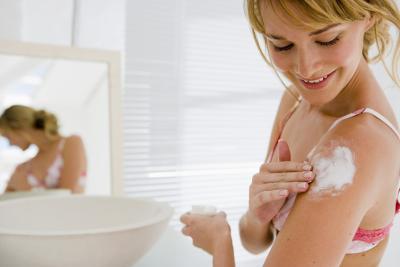Dermal therapy is a type of clinical, nonsurgical skin treatment that can be studied as a degree program at a single Australian university. Dermal Therapy, on the other hand, is a company based in the Canadian province of Ontario that specializes in skin moisturizing products containing urea, which are designed to restore moisture to dry skin.
DRY SKIN RELIEF
Dermal Therapy offers a full line of skin-moisturizing products that contain urea, which the Dermal Therapy website describes as "nature's own skin moisturizer." Urea is a nitrogen-rich substance produced by the human body that the kidney flushes out of the blood into urine. According to the company website, urea causes hydrotopic solubilization, which enables your body's cells to absorb and retain extra moisture. Urea on its own, however, is unstable and won't moisturize the skin. For this reason, the pharmacists and scientists who developed the Dermal Therapy line use a stabilized urea formulation that balances this substance with other moisturizing ingredients, such as pure silk proteins and alpha hydroxy acids.
DERMAL THERAPY TRAINING
Victoria University, in Melbourne, Australia, claims to be the world's only English-speaking university to offer a degree-level course in dermal therapy. Graduates of this course, notes the university's website, can go on to find work in dermal therapy clinics. Dermal-therapy clinics such as Australia's High Street Medical Clinic offer an array of non-surgical cosmetic procedures, pre- and post-operative therapy and clinically managing chronic dermal conditions.
LIPID NANOPARTICLES
A study published in the June 2008 issue of the "International Journal of Pharmaceutics" examined whether lipid nanoparticles could assist the penetration of a topical drug through the horny outer layer of extremely dry skin. Researchers noted a "prolonged anti-inflammatory effect" from drug-loaded nanoparticles, with both direct and indirect evidence corroborating earlier reports that lipid nanoparticles as are effective a helping topical medication permeate excessively dry skin cells.
GLOVES
A study published in the January 2005 issue of the "AORN Journal," the journal of the Association of the Perioperative Registered Nurses, examined potential benefits of a non-latex surgical glove coated with a special dermal-therapy formulation. In the study, 31 health-care workers -- including 24 perioperative nurses -- tested a nonlatex surgical glove that was coated with a special formulation of ingredients that have been clinically proven to have beneficial effects on the health of human skin. At the end of the day-long assessment, 81 percent of the subjects thought the skin on their hands was less dry than it had been at the beginning of the day, while 65 percent thought their skin was better hydrated. In addition, 58 percent rated their skin as "smoother and more supple" after wearing surgical gloves with coating of this special dermal-therapy formulation.



 Posted in:
Posted in: